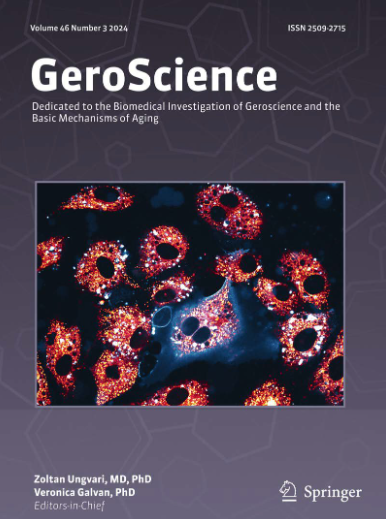Aging-related decline in the liver and brain is accelerated by refined diet consumption.
IF 5.4
2区 医学
Q1 GERIATRICS & GERONTOLOGY
引用次数: 0
Abstract
Studies suggest that diets rich in highly/ultra-processed foods may contribute to the development of diseases. In rodents, the intake of refined (purified) diets has also been associated with the development of various metabolic diseases. Here, performing two experiments, we assess the impact of a refined diet with and without fiber enrichment on aging related health decline in mice. Experiment 1: Male C57BL/6J mice were fed standard chow or refined diet until the age of 86 weeks. Experiment 2: Male C57BL/6J mice fed a refined diet until showing signs of aging related intestinal barrier dysfunction were fed a fiber enriched refined diet (7.5% oat β-glucan or 7.5% cellulose) for 18 weeks. Cognition was assessed at the beginning and end of the dietary fiber intervention, while glucose tolerance was determined at the end of each experiment. Markers of senescence, liver damage, neuroinflammation, intestinal barrier function, and microbiota composition were assessed. Refined diet-fed mice showed higher markers of senescence in plasma and aging-associated liver decline, impaired glucose metabolism and cognitive decline compared to standard diet-fed mice. These changes were associated with differences in intestinal microbiota composition and higher portal bacterial endotoxin levels. Enriching the refined diet with the fibers decelerated the aging-associated cognitive impairments while not affecting aging-related liver decline, insulin resistance or markers of intestinal barrier function. In conclusion, these data suggest that while decelerating aging-related cognitive decline, fiber fortification of a refined diet may not attenuate the diet-induced acceleration of aging related decline in other organs in mice.随着年龄的增长,肝脏和大脑的衰退会因精制饮食而加速。
研究表明,富含高度/超加工食品的饮食可能会导致疾病的发展。在啮齿类动物中,精制(纯化)饮食的摄入也与各种代谢疾病的发生有关。在这里,我们进行了两个实验,评估了含有和不含有纤维的精制饮食对小鼠衰老相关健康衰退的影响。实验1:雄性C57BL/6J小鼠分别饲喂标准饲料和精制饲料,直至86周龄。实验2:雄性C57BL/6J小鼠饲喂精制日粮,直至出现与衰老相关的肠道屏障功能障碍迹象,饲喂富含纤维的精制日粮(7.5%燕麦β-葡聚糖或7.5%纤维素)18周。在膳食纤维干预的开始和结束时评估认知能力,而在每个实验结束时测定葡萄糖耐量。评估衰老、肝损伤、神经炎症、肠屏障功能和微生物群组成的标志物。与标准饮食喂养的小鼠相比,精制饮食喂养的小鼠在血浆和与衰老相关的肝脏衰退、葡萄糖代谢受损和认知能力下降方面表现出更高的衰老标志物。这些变化与肠道菌群组成的差异和较高的门静脉细菌内毒素水平有关。用纤维丰富精制饮食可以减缓与衰老相关的认知障碍,同时不会影响与衰老相关的肝脏衰退、胰岛素抵抗或肠道屏障功能标志物。总之,这些数据表明,在减缓衰老相关认知能力下降的同时,精制饮食中的纤维强化可能不会减弱饮食引起的小鼠其他器官衰老相关衰退的加速。
本文章由计算机程序翻译,如有差异,请以英文原文为准。
求助全文
约1分钟内获得全文
求助全文
来源期刊

GeroScience
Medicine-Complementary and Alternative Medicine
CiteScore
10.50
自引率
5.40%
发文量
182
期刊介绍:
GeroScience is a bi-monthly, international, peer-reviewed journal that publishes articles related to research in the biology of aging and research on biomedical applications that impact aging. The scope of articles to be considered include evolutionary biology, biophysics, genetics, genomics, proteomics, molecular biology, cell biology, biochemistry, endocrinology, immunology, physiology, pharmacology, neuroscience, and psychology.
 求助内容:
求助内容: 应助结果提醒方式:
应助结果提醒方式:


